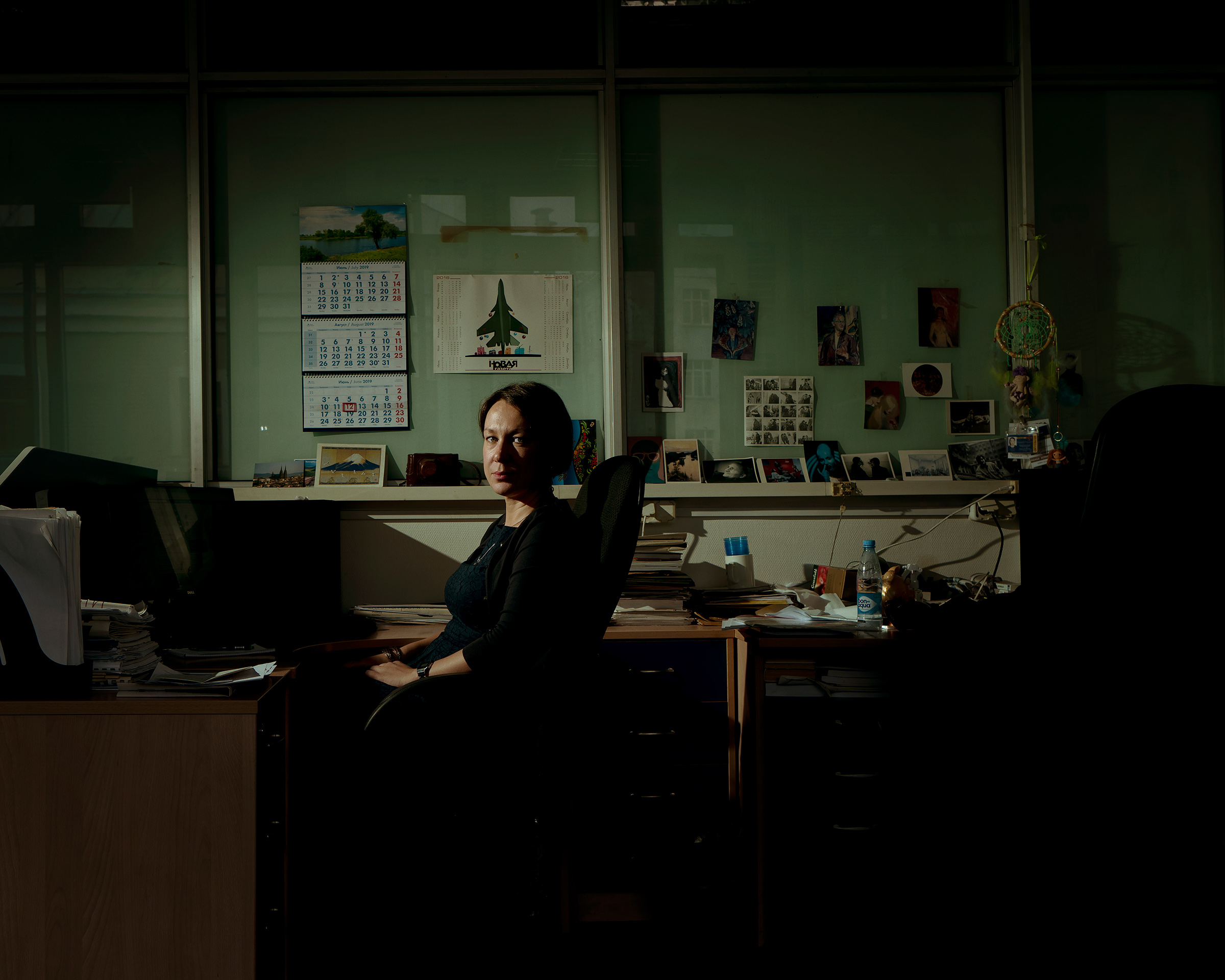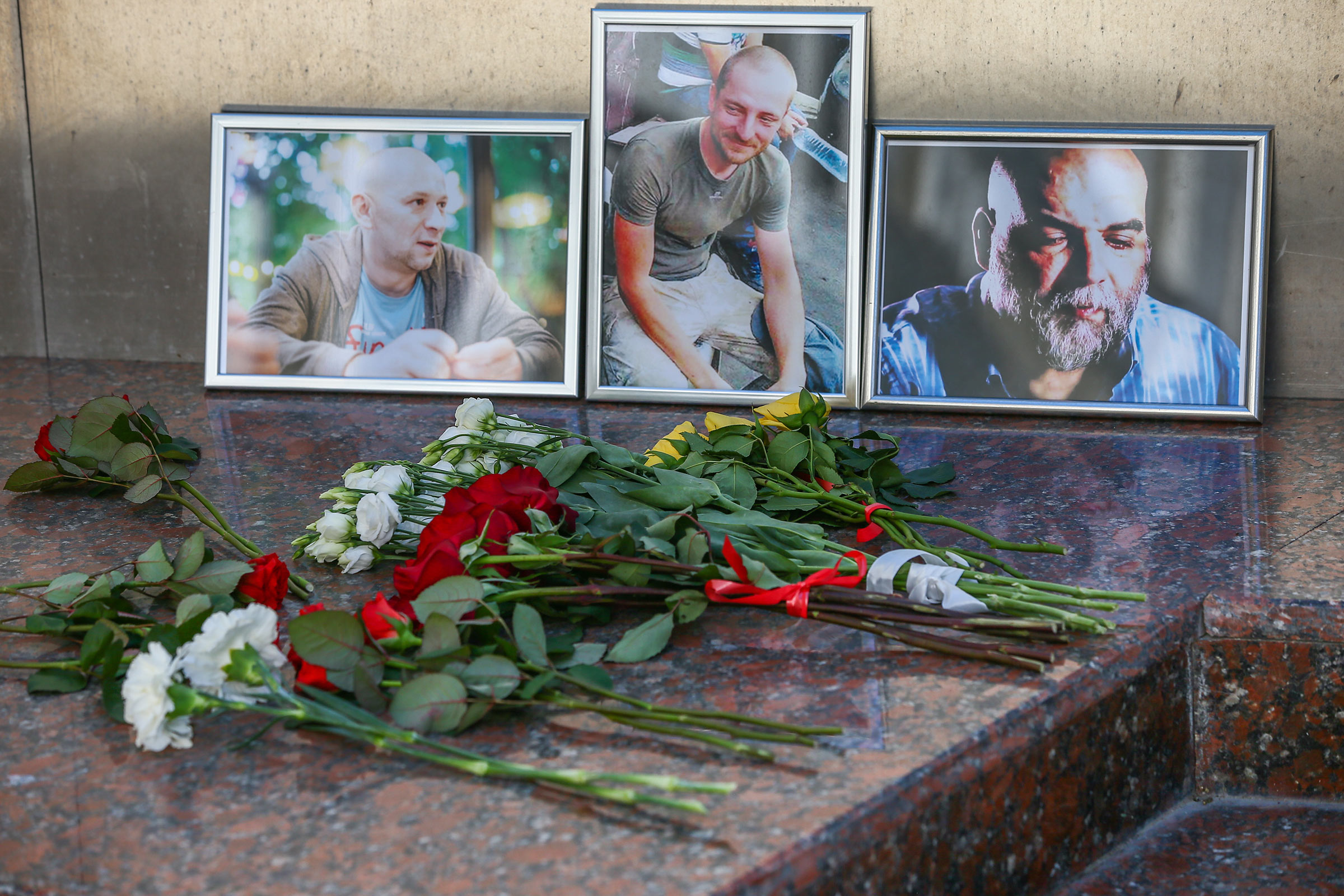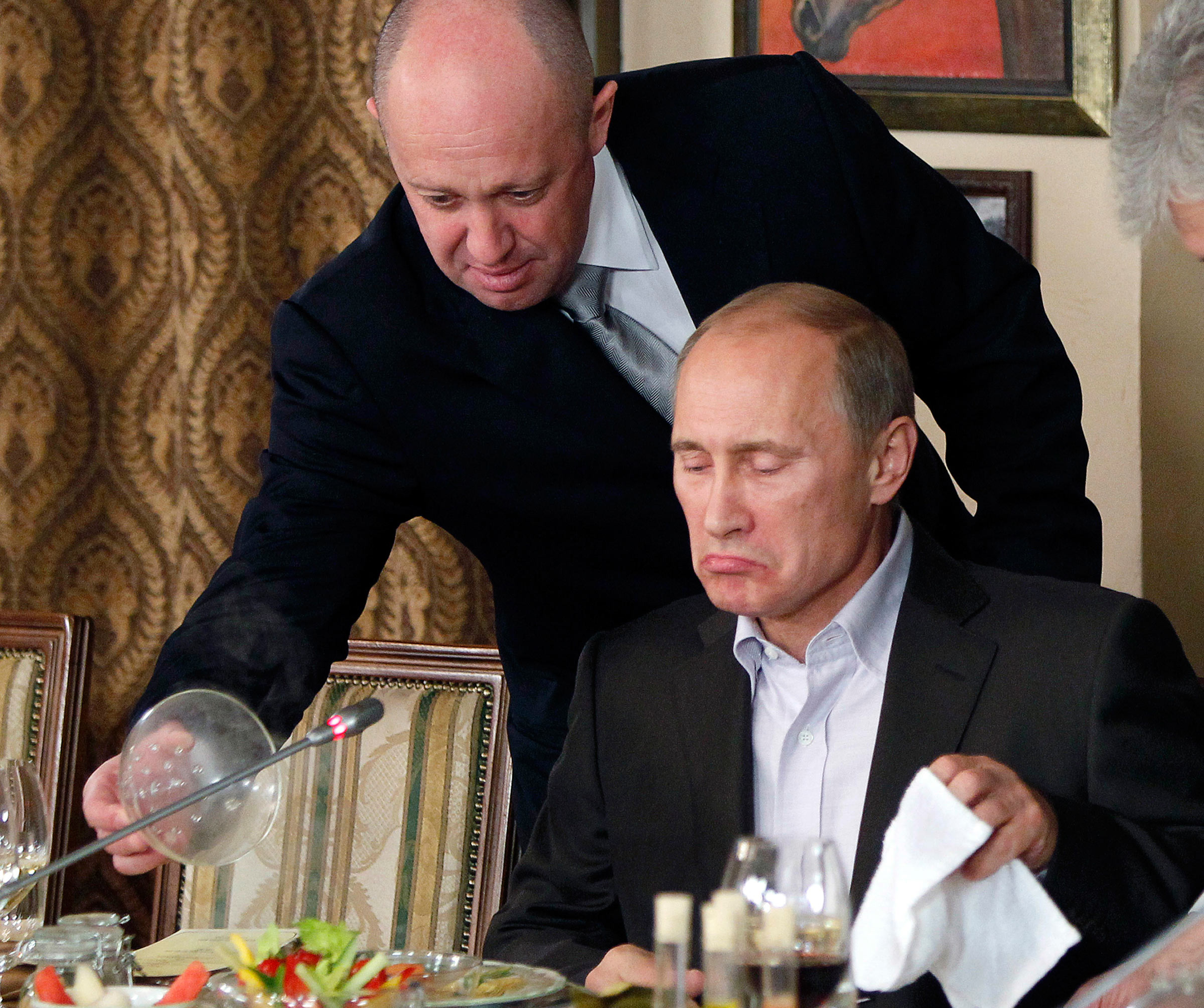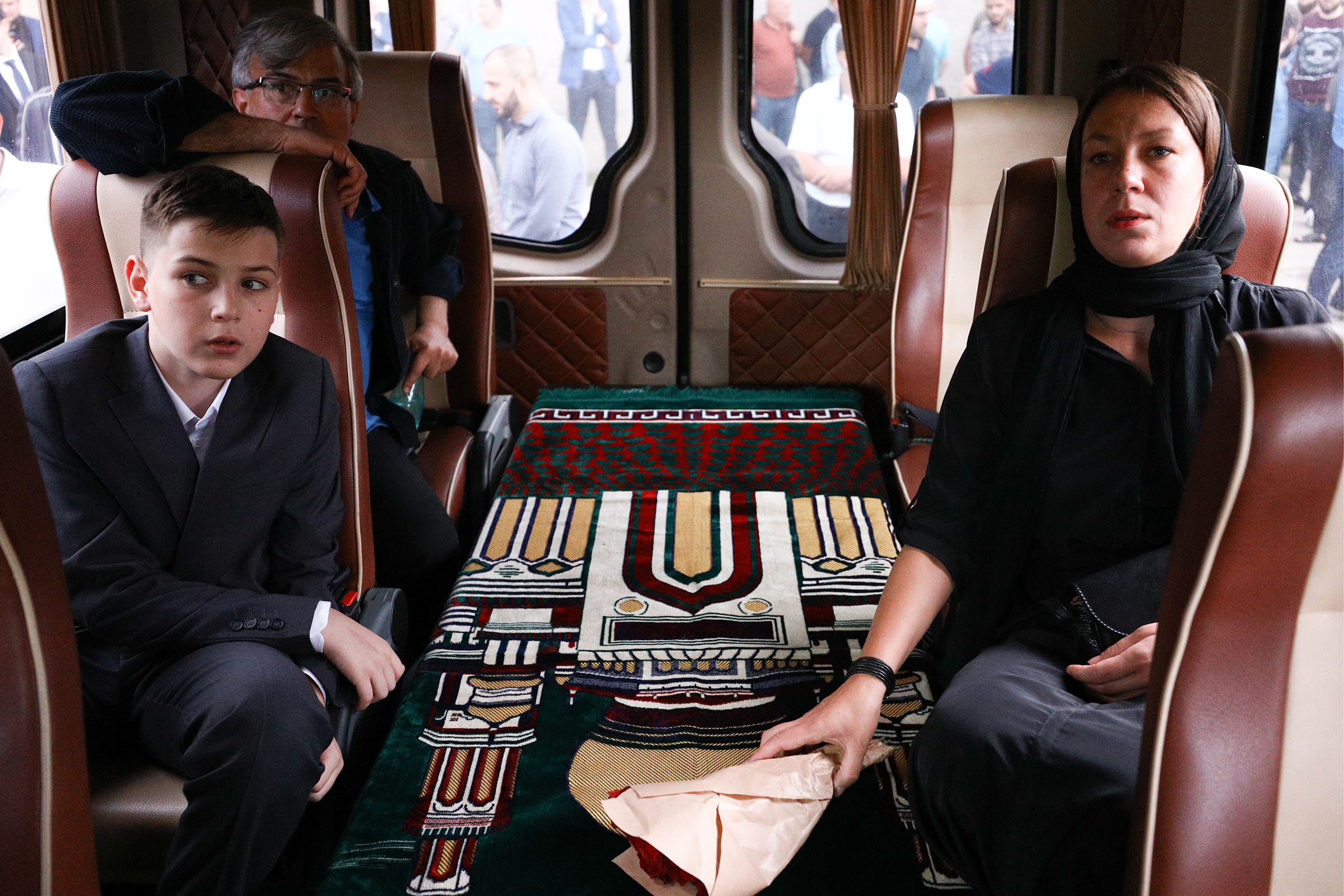
One year ago, on July 30, 2018, three Russian journalists were shot to death and their bodies left on the side of a road near a conflict zone in central Africa. Their names were Orkhan Dzhemal, a renowned conflict reporter; Alexander Rastorguev, an award-winning filmmaker; and their cameraman, Kirill Radchenko. The purpose of their trip to the Central African Republic was to film a documentary about the Wagner Group, a Russian private military company which has been active in several African countries in recent years, and which is believed to have ties with the Russian military and the state.
Authorities in Moscow say the reporters were killed in a random act of violence. It was a robbery gone wrong, goes the official line. But the colleagues of the victims have investigated the murders independently over the past year, and have come to a different conclusion — that known associates of the Wagner Group were involved in these murders.
The victims’ friends and families have meanwhile pled with the authorities in Russia to consider this evidence. Among the most vocal has been Dzhemal’s ex-wife, Irina Gordienko, who is also one of Russia’s most famous reporters. Ahead of the one-year anniversary of the murders, Gordienko described her experience not as a journalist but as a person bereaved and looking for justice.
A version of her account was first published in Novaya Gazeta, one of Russia’s last independent newspapers, where Gordienko is a correspondent. With her permission, TIME is publishing an edited translation of the piece as part of its Guardians series on the escalating war against the freedom of the press worldwide.
Most of my 17 years as a journalist have been spent reporting on the tougher parts of Russia, around the region known as the Caucasus, which has seen too much of war. I have seen dead bodies there, and the signs of inhuman torture that the heroes of my articles endured. I have written a lot about prisons, some of which still haunt me in my dreams. I’ve had to deal with just about every sort of police officer, investigator and prosecutor. But nothing quite prepared me for that day one year ago when Russian authorities summoned me in relation to the murder of my former husband, the journalist Orkhan Dzhemal.
Under the rules of Russian criminal procedure, they had classified me as a victim in the case. I wasn’t the only one. Kirill and Alexander both left behind grieving parents. Orkhan and I have a son. In some ways my work had prepared me for victimhood; I have written about hundreds of criminal cases in which the interests of regular people are barely taken into account. But I never realized what it really means to be a victim, or as the cops like to call me, a terpila, their heartless slang for someone who is made to endure.

Look the word “terpila” up in the Russian dictionary, and you will find several definitions — including “a weakling incapable of self-defense.” Indeed, that pretty much describes how I feel after dealing with Russian investigators in the year since Orkhan was murdered.
I should clarify something before going further: As an official victim in this case, I have signed an agreement with the Russian authorities “on the non-disclosure of information on the preliminary investigation.” It prohibits me from sharing what I know of the police work behind this case. But I’m not too worried about violating that agreement, because I haven’t seen much police work going on.
My main point of contact among the investigators has been Detective Igor E. Zolotov, a beefy man who keeps his hair cut close to his skull. If there had been some police work for him to demonstrate, perhaps he would have shown me the case files already — as the law allows. But he has always refused, each time throwing a thoughtful glance at the thick binder that sits atop his desk whenever I visit his office, its cover marked with the initials CAR, for Central African Republic.
Apart from Zolotov, I’ve had appointments with three other investigators over the past year, all related to my status as a victim. All of them were irreproachably polite yet turned pale each time I began to demand answers to the most elementary questions. They would sigh and complain that there’s nothing to be done.
The official theory offered by the Investigative Committee, Russia’s version of the FBI, is that the murder was committed during a robbery by Arabic-speaking bandits who are active in that part of Africa. I categorically reject this explanation. There is not a single piece of evidence to support the notion that this was a robbery. The most valuable possessions of the victims were left untouched at the scene of the crime.
Yet the authorities in Russia offer no other explanations. They seem content to blame their own inaction on the police in central Africa. All they do is wait for answers to arrive from that continent far, far away. And so, as far as I can see, the Investigative Committee has managed to do nothing at all.
The last time I went to see Detective Zolotov, on July 10, my hope was to find out about a legal request my lawyers had filed exactly a month earlier, through the official channels of the Committee. Our request was simple: Take the article published by my newspaper under the headline, “Chronicle of a well-orchestrated death,” and include it in the official case file.
The article was based on a private investigation carried out by a consortium of journalists known as the Dossier Center. Like Orkhan’s last reporting trip – the trip to Africa that got him killed – the work of the Dossier Center was sponsored by the Russian businessman Mikhail Khodorkovsky, who supports a variety of journalistic efforts from his exile in London. Khodorkovsky does this as part of his vocal opposition to the Putin regime, and out of a desire to hold it to account.
The investigation found that the murder of Orkhan and his colleagues was not the work of some “Arabic-speaking bandits.” The ones responsible are the men Orkhan went there to investigate, the report alleges, with the backing of Evgeny Prigozhin, a businessman better known as “Putin’s chef” because of his close ties to the Kremlin.

Along with our legal request, we provided documents to support the conclusions of the Dossier investigation. These documents implicate known associates of the Wagner Group, a Russian mercenary company that has been linked to Prigozhin ever since it first gained attention in 2014, though Prigozhin denies any connection. The hired guns of the Wagner Group have been active in the Central African Republic since at least 2017. These are the people Orkhan went to the country to investigate.
Cell phone records obtained from the CAR show that men affiliated with the Wagner Group were in regular contact with each other there from July 28-30, when Orkhan and his team were in that country. The Russian mercenaries were also in contact with local police, who appear to have kept close watch over the journalists.
Now, exactly what involvement they had, if any, in the murders is not clear. Prigozhin and others implicated in the Dossier investigation all deny having anything to do with the murders. But we believe the evidence of their connection to this tragedy is at least compelling enough for Russian police to question them.
My lawyers asked investigators to do exactly that, but we received no response. And when I asked Detective Zolotov about this, he looked very surprised:
“It’s the first I’ve heard of it,” he said. “I haven’t seen your request.”
My lawyer, Marina Andreeva, corrected him: “It was delivered in person to the office of the Investigative Committee and handed to your colleague.”
“I get a lot of correspondence, might have missed it,” he said. “Let me check and get back to you.”
The detective got back to us fairly fast. After we’d left, he called and rattled off the following: He didn’t understand what we were talking about at first, but of course, yes, the request had been reviewed and would receive a prompt response.
It came a few hours later. The men affiliated with the Wagner Group would not be questioned by police, Detective Zolotov reported. In his view, “there was not enough information” linking these individuals to what had happened. From my sources at the Investigative Committee, I later learned how the detectives typically talk amongst themselves about questioning someone like Prigozhin: Why, they ask, would we want to disturb such a big and busy person?
Why indeed.
As for our request, and the potential evidence it contained, the investigators said they would look into it as soon as possible. But what, exactly, does the Russian investigation consider possible?
Sending a group of investigators to Africa is apparently out of the question; they say it’s too expensive. Their last trip, in September 2018, had no clear results. It took all of three days.
That same month, my lawyer filed another request: Please deliver the clothing of the murder victims to Moscow. Without their clothes it is impossible to carry out a full ballistic analysis of the gunshot wounds that killed them.
She filed another request for the return of all the private things the team of journalists had with them while in CAR. She also asked that the mobile phone records of Orkhan, Kirill and Alexander be recovered from the local telecommunications company.
By studying these materials, we could reconstruct the events leading up to the murders. We might even be able to set out a plan to find the killers — and discover who they answered to.
But several months later, nothing has been done.

When I ask Detective Zolotov about all this, he again throws up his hands: “We have asked the Central African Republic to assist us. We send them orders, one after another. Nothing helps. There is no legal assistance agreement between our two countries, and we can’t force them.”
This does not appear to be true. In August 2018, the governments of Russia and the CAR signed a military cooperation agreement, which includes the supply of Russian weapons and military instructors to the CAR. In April, that agreement was expanded to allow the Russian Defense Ministry to build an outpost in that country. Within that expanded deal, there is a section that calls for the law enforcement agencies of Russia and the CAR to “cooperate with each other directly” on criminal cases.
So where is this cooperation when it comes to the murder of three Russian citizens on the territory of the CAR? Are their killings not “criminal” enough?
Detective Zolotov sighed. There was one other thing he wanted to tell me, as our most recent meeting came to an end. It had to do with the clothes and other things we had been asking about – three suitcases in all – containing all the stuff that Orkhan, Kirill and Alexander had with them when they were killed. As it turns out, said Zolotov, these things have been sitting at the Russian embassy in Bangui, the capital of the CAR, for over three months. “However,” he said, “it is not possible to send them to Moscow.”
Using the diplomatic post is out of the question, I am told. The Russian Foreign Ministry has declined to help with that, while the Investigative Committee does not have the resources for it. Even the Ministry of Defense refused to help, claiming that its planes “don’t fly there.”
“I might even want to go there and do something about it,” Detective Zolotov told me with a tone of regret as we said goodbye. “But I can’t go on my own, and my bosses don’t send me,” he added, rolling his eyes.
There wasn’t much else to say. The investigation into the murders of three Russian journalists clearly looks to be going nowhere, all thanks to the diligent inaction of my country’s government. That inaction only serves to confirm one thing to me: Orkhan, Kirill and Alexander were not killed during a robbery.
And one day the Russian investigative authorities will have to answer for this. I don’t intend to be their terpila. I will continue pushing for the truth. One day I’ll need to explain to my son who killed his father, and why.
More Must-Reads from TIME
- Why Biden Dropped Out
- Ukraine’s Plan to Survive Trump
- The Rise of a New Kind of Parenting Guru
- The Chaos and Commotion of the RNC in Photos
- Why We All Have a Stake in Twisters’ Success
- 8 Eating Habits That Actually Improve Your Sleep
- Welcome to the Noah Lyles Olympics
- Get Our Paris Olympics Newsletter in Your Inbox
Contact us at letters@time.com